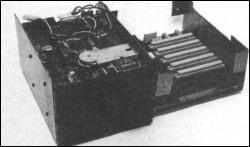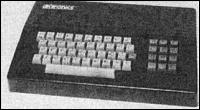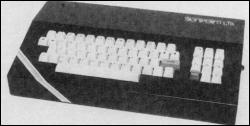| Hardware World |
WITH the recent flood of disc interfaces for the Spectrum the Gordon Microframe has been largely overlooked. Although at £149.50 inclusive it is the most expensive it does have more potential than the others and can be built up into a very comprehensive system.

The Microframe is a disc-based motherboard system with a range of plug-in cards. A number of cards are under development at the moment, ranging from a simple Centronics interface through A to D, D to A, RS232 - for use with a modem - to I/O cards suitable for robotics.
The disc interface software is held on disc and booted into 16K of onboard RAM. That RAM is paged when a syntax error occurs. That means that not only is the DOS easily changeable but also that you can extend the Spectrum Basic; for example, the I/O boards can be driven using a Logo-like language.
As a disc system it is old fashioned in that it only uses single density. That, typically, gives 98K for storage on a 40 track, single-sided drive, and up to four drives can be used.
All the necessary commands are available: Load, Save and Verify for Basic, Code and Data plus Format and Erase. Open and Close are soon to be added. As it does not take up any of the Spectrum memory, even for a buffer, transferring software to disc is relatively easy. Gordon expects to release commercial software on the system soon.
The motherboard has been well thought out and it is quite straightforward to add your own boards.
The manual is comprehensive and gives details of all the relevant pin outs plus a description of what each one is used for. There are example programs, with some simple ones on disc, including one showing how to extend the Basic.
Although the board can be powered from the Spectrum Gordon does not recommend it as the tolerances are tight. It is designed to be powered from disc drives and, if those need power, Gordon supplies a supply for £63.25 inc.
The system is expensive, as you are paying for facilities that you are unlikely to use. In education, however, those facilities would be used to the full.
Gordon Microframe Ltd, Ayr.

THE DK'tronics keyboard has undergone many design changes since it was first introduced for the ZX-81, but it has always retained stuck-on legends. DK'tronics has now relented, and printed keycaps are available as an optional extra for the Spectrum keyboard.
The caps are printed in one colour, black, although the caps themselves are grey for the main keyboard, and red for the numeric pad.
Fitting the caps is simply a case of pulling the old ones off and pressing the new ones on. Instructions are not included, which would have been useful as you could damage something by being heavy handed.
For only £6.00 inclusive the caps are good value if you own a DK'tronics keyboard. If not, they could tip the scales in its favour if you are about to buy.
Three-colour printed caps might have been preferable, even at a few pounds more, but it is a step in the right direction.
DK'tronics Ltd, Essex.
INTERFACE III is a combined hardware and software package which allows you to transfer a program.
Once the program is loaded a button on the interface is pressed and a special copy is then put out to tape. After resetting, the interface software is loaded and the copy reloaded.
Interface III priced at £39.95 is awkward to use, requiring a lot of loading, saving and resetting.
Micro Centre, Worcestershire.
ALTHOUGH Sinclair is no longer building 16K Spectrums, some shops still have few left in stock and are selling them at bargain prices, in some cases for as little as £69.95. Upgrade prices are also coming down so if you are prepared for a little DIY you could end up with a new 48K Spectrum for only £89.95.
The cheapest upgrade we have found is the Citadel 32K memory expansion, £20.00 to readers of Sinclair User, £24.00 to everyone else, including VAT and p&p. It has an advantage in that it uses 64K chips, rather than 32K, so that if you buy the TV Services of Cambridge system, you get two 32K pages of memory.
First catch a 16K Spectrum, then contact Citadel Products Ltd, Middlesex.
TRANSFORM is considered by many to have produced the Rolls Royce of the add-on keyboards for the Spectrum.

While other keyboard companies have reduced prices, or even stopped producing since the launch of the Spectrum Plus, Transform has shrugged it aside, improved its keyboard, and increased the price to £79.95.
The improvements are the inclusion of four shifted cursor keys and an additional Caps Shift to the right of the bottom row of keys, matching the one on the left. The numeric pad has been altered to include a Full Stop and an additional Enter key. The old single key functions on the main keyboard are retained.
Inside, the additional interface required by some Spectrum Issue 3 users is fitted as standard.The power supply now has to be connected to the keyboard, a lead then plugs into the back of the Spectrum. The redesign, and the metal case, results in the keyboard weighing over 3kg even before the Spectrum is fitted, a veritable heavyweight.
The Transform is definitely for the serious user; the key switches alone cost the manufacturer more than the Spectrum Plus upgrade, and it is the only keyboard with three-colour key caps. Transform might not sell many keyboards at that price but there are times when only the best will do.
Transform Ltd, Kent.
THE NIDD Valley Slomo was a good idea, as was the Kempston joystick standard. DK'tronics has brought out the Games Player, a combined slow motion/Kempston compatible joystick interface.
The Kempston standard is available on most popular games and the ability to slow down a game to a manageable speed is a boon to finger-bruised alien zappers.
The interface has a joystick socket, speed control and slow motion on/off switch on the top. Unlike Slomo you can not freeze the action completely but you can slow it down more than enough for most needs. At £14.95 it is good value.
Meanwhile Nidd Valley has stated that if their UK Patent application is successful slow motion peripherals will only be available from them. The ensuing wrangle could be interesting.
DK'tronics, Essex.